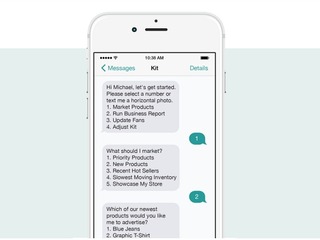Global AI in healthcare market expected to rise to $164B by 2030
The market size for 2023 was $10.31 billion
Read more...
Slack has no shortage of funding to play with. The company been raising a ton of money since the end of 2014, including $200 million in April of this year, giving it nearly $540 million in the bank.
So, it decided that it would be a good idea to invest some of that capital, partnering with some of the top venture capital firms in the Valley to create an $80 million fund late last year. The idea was to give support to developers who want to build their app for the Slack platform, as well as other apps the company can integrate in the future.
Now we're finally learning more about the investing strategy, and it looks like the answer is bots. Lots and lots of bots, as the company revealed on Tuesday that it, along with its partners in the fund, has now invested over a total $30 million in 14 different companies. Only $1.97 million of that funding came directly from Slack, with the rest coming from its VC partners, including Accel, Andreessen-Horowitz, Index Ventures, KPCB, Spark, and Social+Capital.
Nearly all of the companies who have recieved funding have products revolving around bots.
"When we started the Slack Fund, we thought a great deal about what it takes to build an ecosystem — an ecosystem where a good idea can become a lasting business, and where we, together with our developers and partners, can dramatically shape the future of work for the better," the company wrote.
"To build this kind of ecosystem you need a shared mission, great developer products, a solid distribution mechanism and finally, to help apps make it in the long run, money."
When the fund was first announced in December, it had already invested in three bot companies: Small Wins, Howdy, and Awesome.ai, meaning it has made an additional 11 investments in the last seven months.
They include Abacus, which Slack describes as an "intelligent expense reporting software that brings report creation and approvals right into Slack," and Birdly, which connects Slack and Salesforce so that anyone can access the information they need about a given account.
Another investment was in Growbot, which lets users encourage and commend their teammates, and Myra Labs, which helps developers build bots with an API that provides machine learning modules out of the box.
The other investments include Butter.ai, Candor, Konsus, Lattice, Sudo, and Wade and Wendy.
Maybe it shouldn't be much of a surprise that Slack is so interested in bots, given that, when it announced the fund, it also revealed Botkit, a framework, created by Howdy, that is meant to simplify the creation of apps, and especially bots.
The other big piece of news that Slack had revealed at the time was the creation of the Slack App Directory, a resource for Slack's clients to find over apps for them to offer to their team, making it easier to find apps by sorting them into curated lists by category, popularity, and staff favorites. Categories include design, marketing, office management, developer tools, and productivity.
On Tuesday the company revealed that there are now over 600 apps in its App Directory, 200 of which were added in the last two months.
The rise of chat bots
The rise of chatbots has been one of the dominant themes of tech this year, with a number of companies making bots a major part of their social strategy. That includes Kik, which launched its own bot store in April, following its purchase of fashion advice bot Blynk in December. The Bot Shop features bots from a list of Kik's partners, including Funny Or Die, Riffsy, Sephora, Vine, and The Weather Channel.
In April, Shopify bought chat bot Kit CRM, a virtual marketing assistant that leverages messaging to help businesses market their online stores.
Kit can build Facebook ads targeted to the audience most likely to buy, and it can also build carousel ads to market several products at once. Kit can also update fans with Facebook posts and email marketing campaigns when there are new products to showcase. And it can send personalized thank you emails to new and repeat customers after a purchase to build brand loyalty.
The acquisition of Kit came only a day after Shopify announced that it would be integrating with the new Facebook Messenger Platform, which gave tools to 50 million businesses so that they can build their own chat bots to reach the 900 million users on Facebook Messenger.
Google has also gotten in on the action, unveiling smart messaging app Allo, which has Smart Reply built in, so users can respond to messages without typing a single word. Smart Reply learns over time and will show suggestions that are in the user's style. It also features the Google assistant.
Foursquare also launched its own bot, called Marsbot, which tells users where to eat or drink.
The most infamous example of a company trying to launch a bot, though has to be Microsoft, which released Tay, an artificial intelligence-powered chatbot, earlier this year. Eventually Tay started mimicking the offensive behavior of Twitter users, including racist and homophobic language, and the company eventually had to take it down and apologize.
Not that the company is giving up. It subsequently released a bot called Rowe, which gathers articles that the users will want to read based on their interests, with personalized suggestions based on a user's social media likes.
(Image source: medium.com)
The market size for 2023 was $10.31 billion
Read more...At Culture, Religion & Tech, take II in Miami on October 29, 2024
Read more...The company will use the funding to broaden the scope of its AI, including new administrative tasks
Read more...



